Op-Ed
Glebelands, Part One: Durban’s hostel dwellers the collateral damage as Public Protector fights battles on all fronts
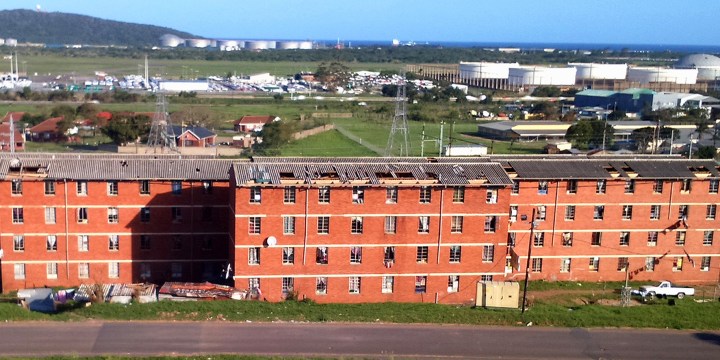
This is the first in a two-part series exposing administrative failure and alleged corruption at South Africa’s most violent hostel, how it came about and how the Public Protector is failing to deal with it.
Earlier in 2019, Public Protector Busisiwe Mkhwebane announced budget constraints limited her ability to take legal action against institutions that failed to comply with her recommendations. The eThekwini Municipality was among those she named and shamed for its failure to implement remedial actions at Glebelands Hostel. More than two years down the line the 22,000-strong hostel community is still awaiting her office’s intervention – their only access to justice.
***
In December 2015, former Public Protector Thuli Madonsela visited Glebelands Hostel in Umlazi, south Durban. Many months before, the KZN office of the Public Protector (PP) had ignored appeals from the Commission for Gender Equality to investigate the unprecedented levels of violence at the hostel, particularly the forced eviction of dozens of women and children from their hostel rooms.
Madonsela’s draft report, released in October 2016, found that the eThekwini Municipality, the police and the Department for Social Development (DSD) had failed to uphold the community’s constitutional rights, which constituted maladministration and improper conduct. The June 2017 final report penned by Madonsela’s successor, Busisiwe Mkhwebane, made almost verbatim findings.
The recommendations were generally welcomed – proper maintenance should be undertaken, residents were to be provided equitable access to municipal services and a safe and clean environment, and the SAPS and DSD were required to do their jobs. All good, it seemed.
But closer scrutiny reveals some of the prescribed remedial actions to be poorly conceived and poorly researched, with scant regard for the eThekwini Municipality’s long history of administrative bankruptcy or the prevailing deadly political climate. Certain recommendations uphold outdated, inhumane policies that are inconsistent with the Constitution.
Other recommendations could be used – and maybe are already being used – as blunt political instruments to eject from the hostel leaders perceived as opponents of rival ANC factions. Some recommendations threaten residents’ only means of earning a living. If implemented these recommendations could prove disastrous for the community, force thousands more into a life of crime and lead to profound socio-economic hardship.
Where poor or conflicting legislation exists, it should not be applied willy-nilly, especially with regards to communities as vulnerable and volatile as Glebelands. The PP has the power to change this, or at least instruct the relevant authorities to rethink faulty policy.
But critical input and concerns raised repeatedly by the community and other stakeholders since the release of the draft report in 2016 have been consistently ignored and fears downplayed. These shortfalls increasingly threaten the fragile ceasefire following the 2017 arrest of a Glebelands rogue policeman, seven of his henchmen and other hitmen. If conditions that motivated the meltdown persist, it will only be a matter of time before others step in where they left off.
The PP was also requested to investigate allegations of corruption and irregularities involving Glebelands contracts, considered by many, including the police, to be one of the driving factors behind the violence. This has not happened.
Hostel dwellers do not have the means to launch costly and complicated legal challenges and must rely on engagement, trust and the goodwill of this Chapter Nine institution to fulfil its constitutional obligations. But, unfortunately, the institution’s capacity seems increasingly focused on selective, politically-driven investigations of specific high-profile individuals. Punitive costs orders already awarded against the PP have eaten into the institution’s supposedly limited budget, further diminishing its capacity to follow up on less high-profile – but more constitutionally relevant – cases. Justice for the poor majority is suspended while the elites wage war in the political stratosphere.
A legal precedent at Glebelands could be instrumental in changing the lives of hostel communities all over South Africa and go a long way towards reversing the harms of the colonial and apartheid era’s iniquitous migrant labour system. But the PP has displayed a disturbing lack of will to take on the eThekwini Municipality – ground zero of the Zuma fightback campaign. It has also been an uphill battle to goad the institution into performing the critical oversight needed to squeeze even a modicum of compliance from the unresponsive municipality, which, so far, it has failed dismally to do.
Intervention paralysis
Responding to the recent deployment of the SANDF on the Cape Flats, the Deputy Public Protector, advocate Kevin Malunga, tweeted: “This should have been done at Glebelands and other hostels on an ongoing basis to remove all firearms from the premises. Our Intervention has been paralysed by the leadership issues in eThekwini.”
Malunga later told TimesLive that: “The Public Protector could not move forward because ‘the mayor’s on leave and the alleged tiff between her and the city manager’,” – a reference to the R208-million tender fraud case for which eThekwini mayor Zandile Gumede, housing committee chair Mondli Mthembu and businessman Craig Ponnan were recently arrested and in which 62 other councillors are implicated. City manager Sipho Nzuza has reportedly turned state witness and is accompanied everywhere by a pack of bodyguards.
Meanwhile, Fawzia Peer – who took over the mayoral reins after the ANC reluctantly forced Gumede to take a leave of absence during which the party’s provincial executive pondered charges against her, and whether or not her bail conditions would impede her ability to do her job – survived an alleged poisoning-by-paraffin attempt. Together with Gumede’s rent-a-crowd (to whom Metro Police allegedly delivered biryani during recent protests), this infuriated municipal workers and disgruntled waste removal contractors and has plunged the city into anarchy, halted ailing service delivery and blown the lid off the ANC’s lethal factionalism.
As political commentator Xolani Dube put it: “There is no ANC in the province, we have a conglomerate of people sharing one common goal – the looting of future generations.”
Aside from Malunga’s mastery of understatement, his support for hostel military intervention instead of working towards resolving historical injustices and seeking sustainable solutions is shortsighted and deeply disturbing. Malunga must be reminded that soldiers failed to crush the struggle against apartheid. A return to jackboot authoritarianism has no place in the ongoing struggle for democracy. But the more pressing immediate concern is that Malunga’s limp-wristed tweet merely kicks the Glebelands can even further down the road to nowhere.
In the TimesLive report, Malunga complained that Gumede failed to arrive for an in loco site inspection in April 2019. Although Malunga’s inspection went ahead, he failed to tell the press that his team had also snubbed residents who waited for over two hours at the community hall for a meeting with Malunga, the mayor and other city officials, which, only the week before, he had insisted community representatives attend.
Many had taken unpaid time off work and swallowed considerable fears of attending a meeting with city and political functionaries who many believe are behind the Glebelands carnage. The community learned later through the media that they had been let down – again. Although hostel dwellers are accustomed to arrogant state officials who appear to deem them less deserving of life’s usual little courtesies, the slight was still painful. Another failed opportunity to bring the community on board. But moving on…
Malunga claimed the municipality also failed to provide feedback and an action plan after Gumede apologised in March for the city’s failure to implement the PP’s remedial actions. So there it sits, it seems. Perversely, Glebelands will apparently be denied justice because law enforcement has finally acted against allegedly crooked government officials.
Surely we should be celebrating this small victory and acting swiftly to resuscitate service delivery in the absence of at least some ANC gangsters, and not using it as an excuse to sit on the fence? There is any number of senior departmental officials who can, and must, step into the breach. Gumede is a liability and must go. A municipality the size of eThekwini with the largest budget in the country simply cannot be held to ransom by the ruling party’s accountability allergy. Let senior state employees for once earn their obscenely inflated salaries.
Or Malunga could have used his tweet constructively to add weight to the call for the city to be placed under administration.
In terms of Glebelands, as was pointed out in an email to Malunga on 4 July: “We should [not] be waiting for whatever decision the KZN ANC makes regarding their thug deployees to determine the course of justice.”
As one Glebelands leader put it: “Does this mean if Zandile [Gumede] dies tomorrow nothing will ever be done at Glebelands because she is dead?”
But depressingly, recent developments (or the lack thereof) are just the latest in a long struggle against the not-so-hidden forces of a corrupt predatory elite – of which the myriad hostel killings have manifested merely as the most visible, bloodstained tip of a large iceberg – lurking beneath the surface of South Africa’s sham democracy and within its broken and politically-tainted institutions of accountability.
Unconstitutional
Among the problematic PP recommendations are those that require the implementation of the outdated, inappropriate and deeply unconstitutional 1998 eThekwini Hostels Policy which envisages such disturbing and discriminatory principles as: “Pregnant women will not be allowed to raise their babies in the Hostel” [Section 3.1.(c)(f) – Regularisation Procedure To Be Implemented].
The Public Protector also authorised the eThekwini municipal manager to ensure that: “Trading within the hostel premises is controlled as per Hostel Policy.” The Hostel Policy, however, undertakes “…to terminate illegal trading and businesses within the Hostels.”
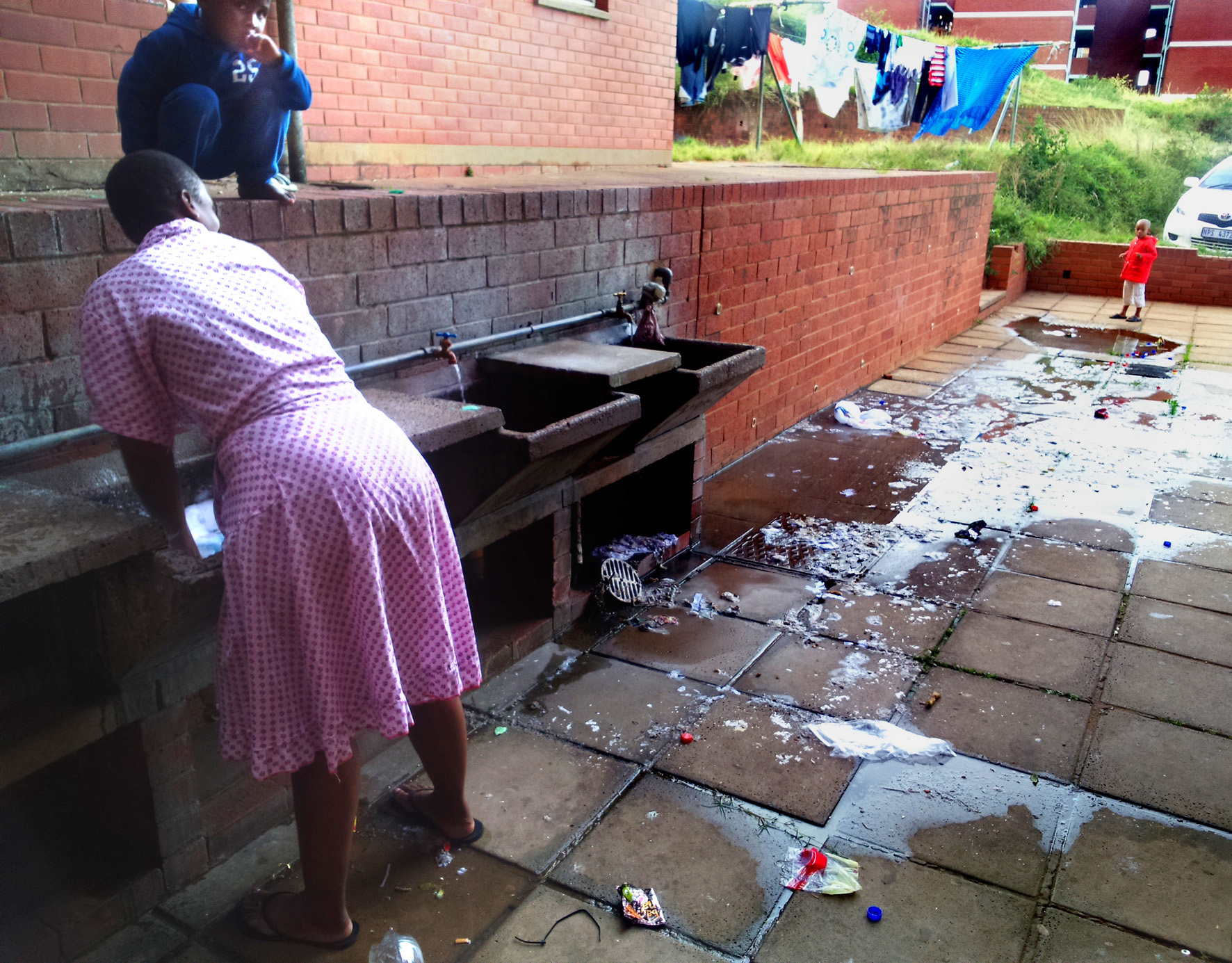
The 1998 eThekwini Hostels Policy prohibits pregnant women from raising their babies in the hostel. (Photo: supplied)
While the many hostel taverns undoubtedly exacerbate social decay and increase the prevalence of substance abuse and domestic violence, this is no less the case across society in general. Prohibiting liquor does not remove the desire to drink. Does the PP endorse national prohibition?
And if Glebelands taverns are closed down, the same policy will apply to all informal traders. The dozens of tiny tuckshops from which widows and single mothers sell vetkoek and airtime, and the seamstresses who work long hours in their cramped rooms to scrape together enough money to put their kids through school, will be deprived of their only source of income. The informal workshops where unemployed mechanics repair residents’ cars will be forced to stop operating.
And why stop at Glebelands? The 1998 Hostels Policy applies to all eThekwini’s 11 hostels – the combined population of which numbers over 200,000 – so the knock-on socio-economic fallout and impact on crime levels could prove catastrophic.
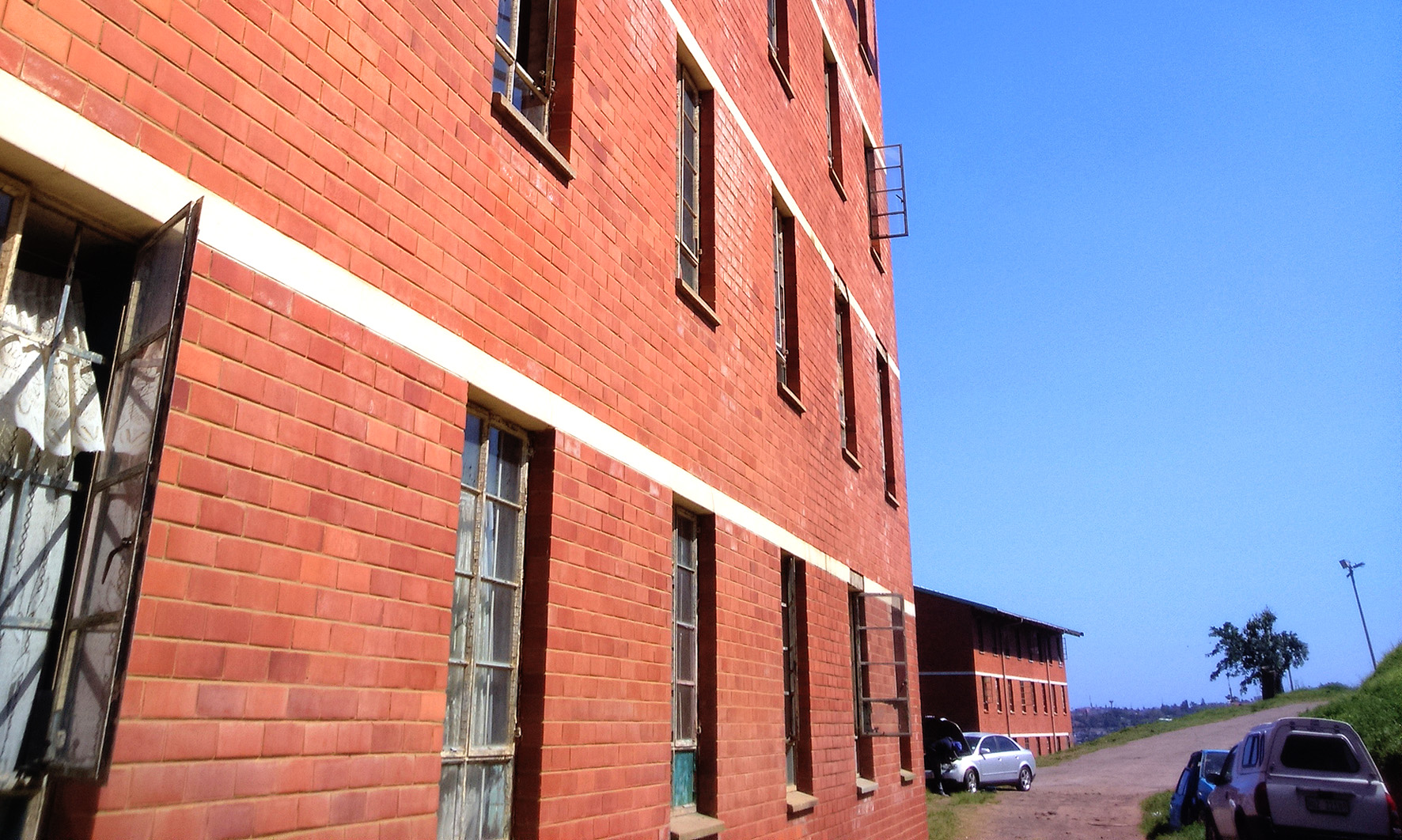
More than half of Glebelands 71 blocks house several hundred people in tiny, cramped rooms. (Photo: supplied)

The Public Protector’s 2017 report required the Glebelands community be provided equitable access to municipal services. (Photo: supplied)
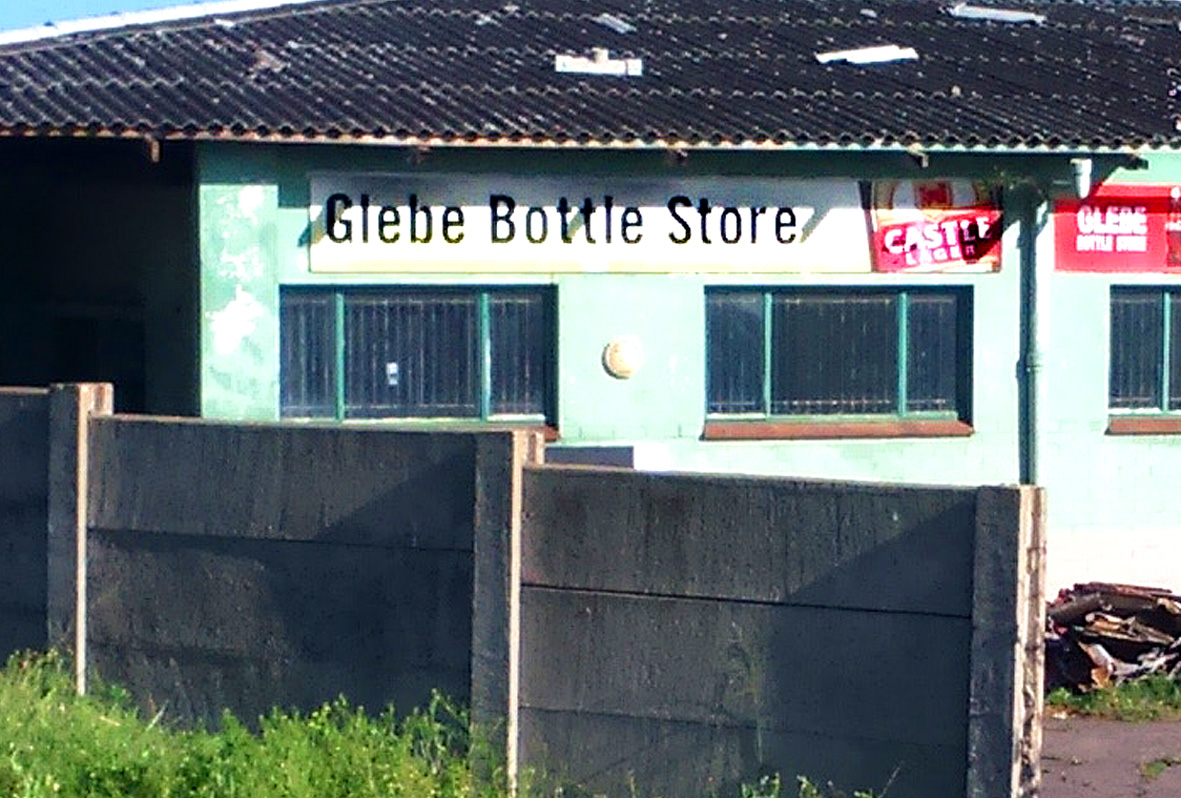
A derelict tavern at Glebelands. Many residents rely on tiny container shops to earn a meagre income. (Photo: supplied)
‘Dompas’ 2.0
The Public Protector’s report also recommended “access control” and “the regularisation of residency is implemented as per the Hostel Policy.”
However, little thought was spared for the impact of the return of strict access control on hostel dwellers, many of whom still bear the unhealed emotional scars of the apartheid regime’s brutal “dompas” system – a system which many – even IFP collaborators – sought to destroy.
Without consultation, increased security measures have already been revisited upon the community. About 60 CCTV cameras at an estimated cost of about R17-million have been installed around the hostel (footage from which has failed to contribute to even one court conviction). Yet failure to repair street lighting – the most basic of security measures – often leaves large portions of the hostel in darkness for months at a time. Expensive perimeter fencing has been erected instead of addressing overcrowded and appalling living conditions.
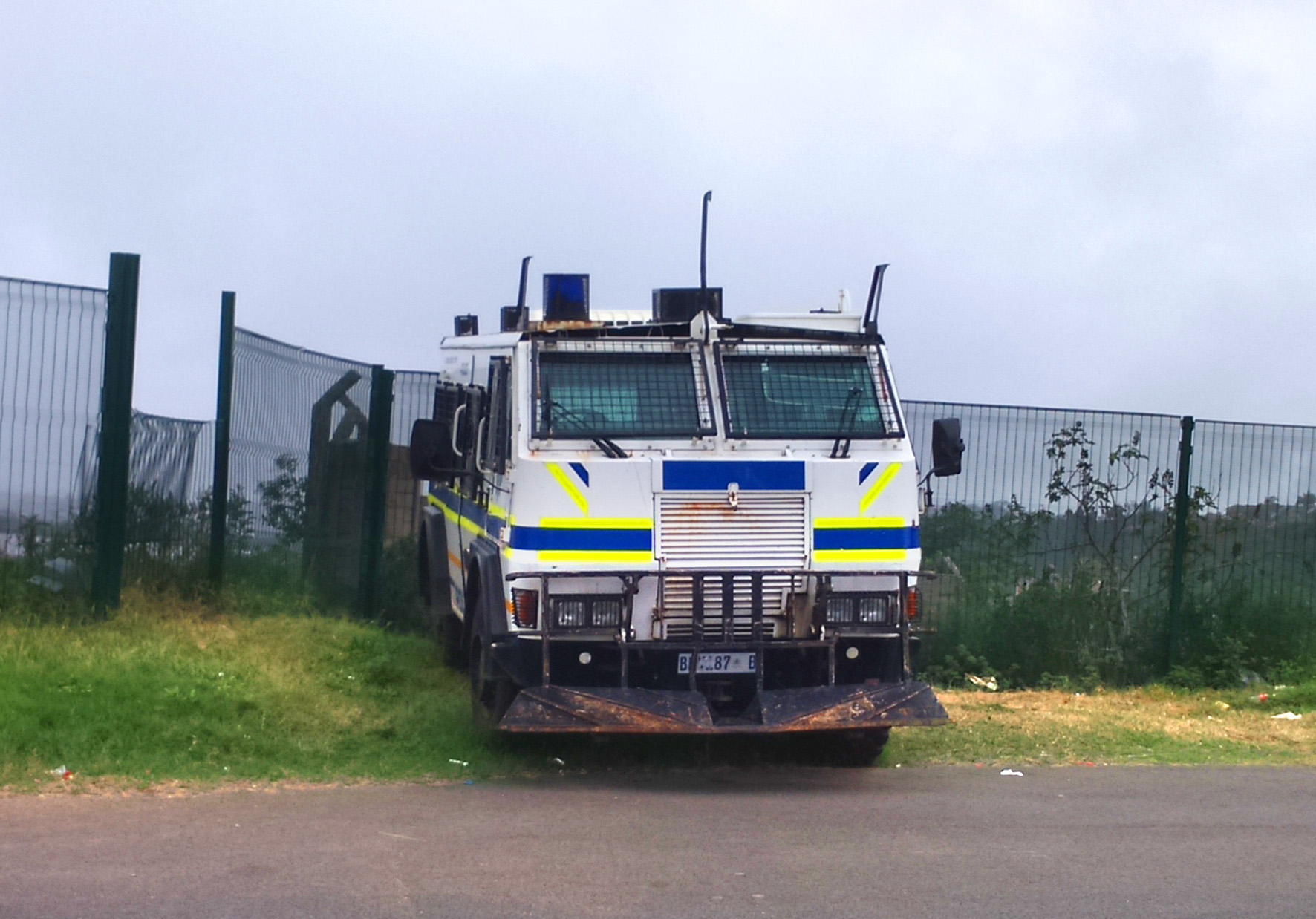
Apartheid flashback – a Casspir parked near Glebelands’ controversial security fence. (Photo: supplied)
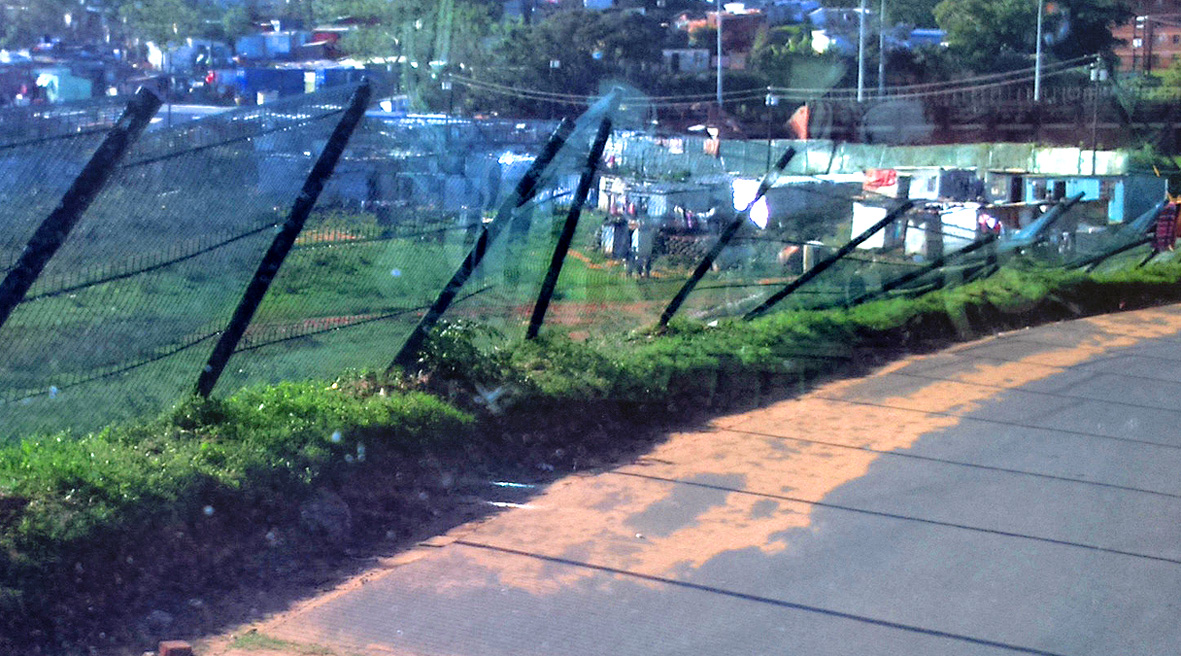
Safety measures – sections of a costly security fence installed in 2016 blew down in Durban’s 2017 mega-storm. (Photo: supplied)
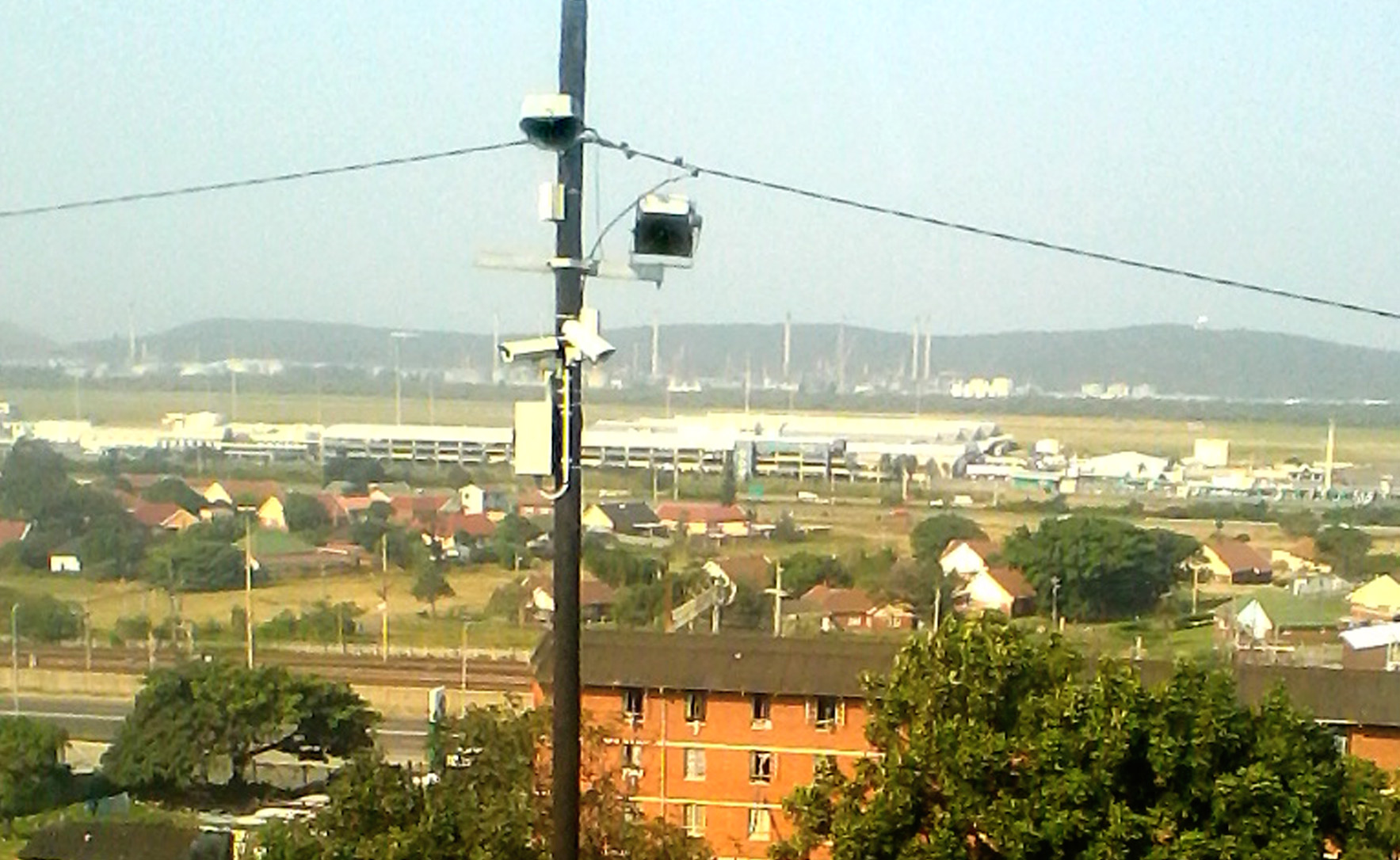
Big brother – between 50 and 60 CCTV cameras are dotted around Glebelands. (Photo: supplied)
And as residents have pointed out, the enemy is within. Killers hide in their rooms after committing a murder – they do not run out of Glebelands. There is no external threat to the community. The municipality has also undertaken to implement a biometric access control system, which, given state entities’ alleged role in the violence, could further threaten residents’ security as well as their constitutional right to privacy.
Billing blues
Likewise, in the drive to impose poorly-conceived remedial actions over a broken system, both PPs paid scant attention to the challenges presented to the “regularisation of residents” by the dysfunctional billing system.
In 2006, for a variety of justifiable reasons (too lengthy to describe in this article), eThekwini hostel communities declared a rent boycott. Six years later – no sense of urgency here – the municipality convened a hostel indaba to discuss, among other issues, rental payment. However, matters remained unresolved so the rent boycott continues at most hostels.
Administrative complaints at Glebelands include “double-billing” in which tenants’ names are changed on the computerised billing system, or rental agreements are terminated without tenants’ knowledge or adherence to legal processes. This has led to conflict between former tenants and “usurpers” who both, it seems, receive bills for renting the same space in the same room. This has been further complicated by violent evictions, the root causes of which the municipality still refuses to acknowledge or mitigate.
eThekwini Municipality’s controversial Revenue Management System (RMS) is responsible for Glebelands’ billing chaos. RMS was developed by an India-based company, CityWorks, owned by IT businessman and alleged ANC backer Willy Govender, a recipient of numerous other state IT contracts. Council approved the RMS contract in 2004 at an initial cost of R90-million and the system was to have come online by 2007. But it was not until 2016 that the system eventually went live, with costs estimated to have ballooned to an astounding R1-billion.
This contract was among those flagged in the Manase Report – the 2013 probe into the eThekwini Municipality’s finances that exposed grand-scale corruption – as having been issued irregularly with supply chain policies not adhered to. After the system eventually came online, RMS reportedly cost a further R16-million annually just in maintenance and licence fees. So great was the number of public complaints that municipal staff picketed the revenue services unit to demand answers from management.
In 2018 the mayor was found to have lied to the public that a task team had been set up to investigate the malfunctioning system – there was no task team.
Insert pics 8, 9
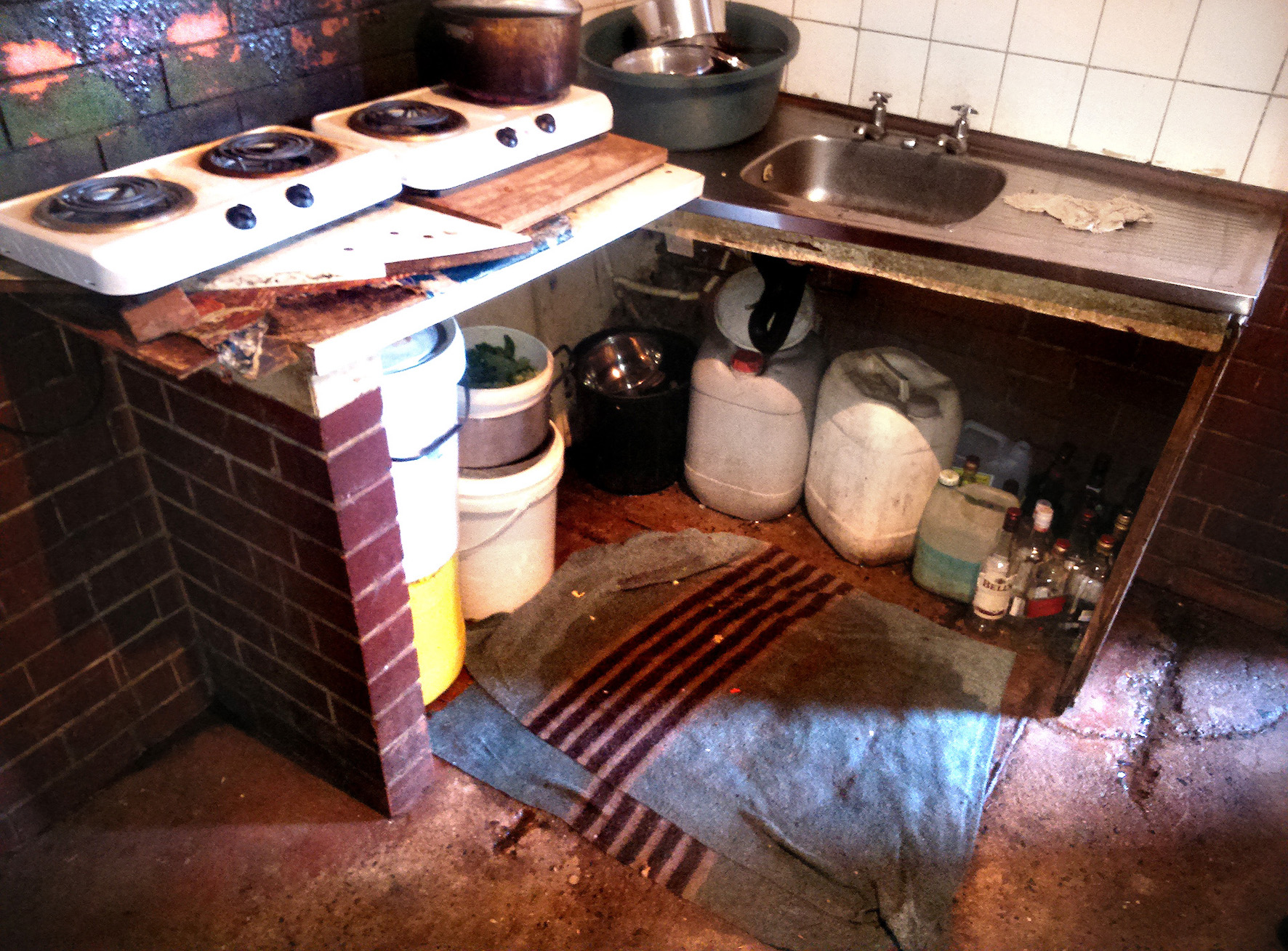
‘Parlous living conditions’, as described by the Public Protector during her 2015 visit to Glebelands, do little to encourage residents to pay their rent. (Photo: supplied)
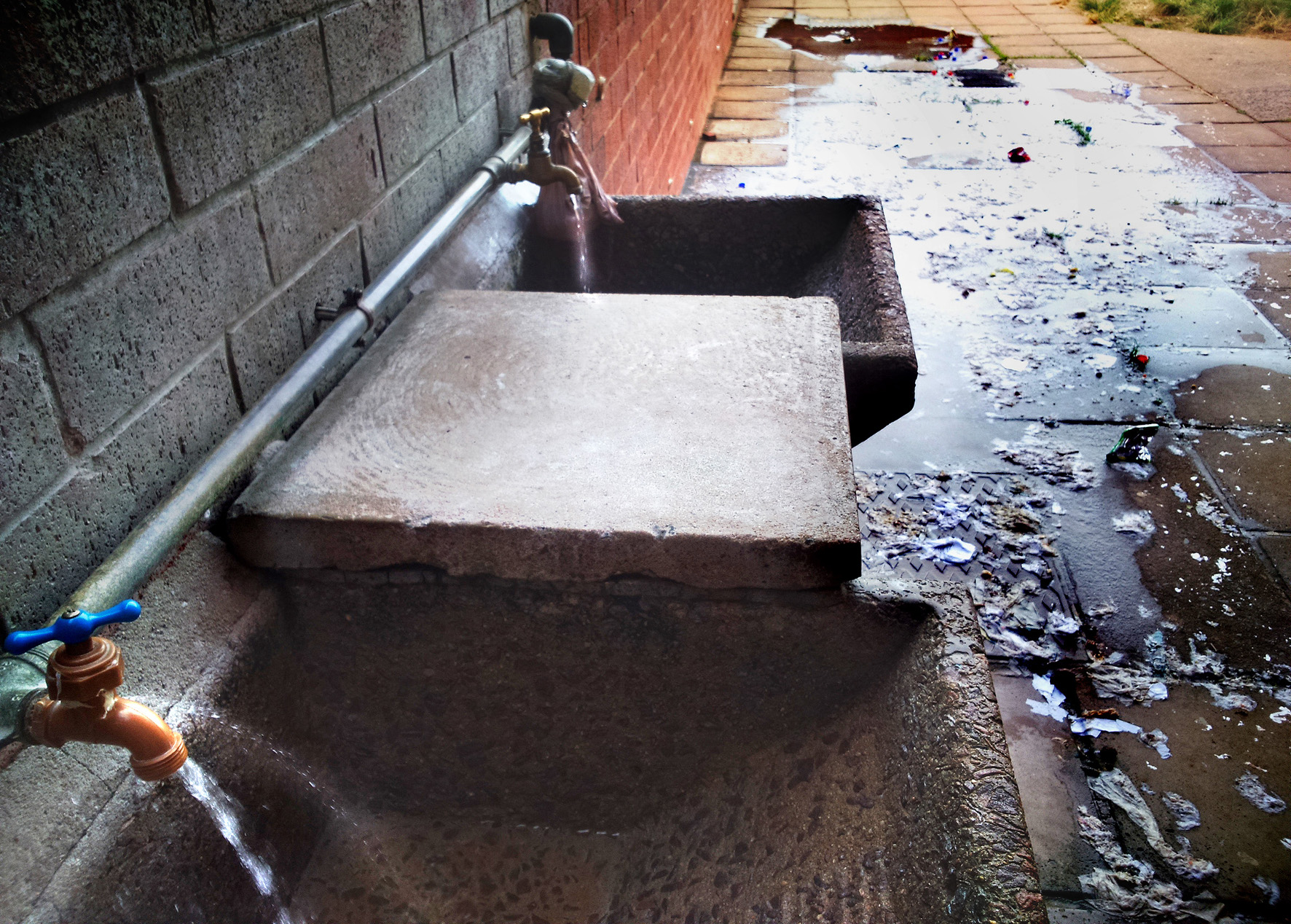
As early as 2003 the municipality admitted that timely repairs and upgrading basic infrastructure led to significant savings in electricity and water bills. (Photo: supplied)
RMS has been dogged by technical problems since the outset and remains generally dysfunctional. Some of the problems included: inexperienced managers, unreliable, inconsistent, incorrect, corrupted or vastly inflated readings, incorrect account types, manual interventions which led to delays, and charges routinely based on estimates (which are apparently unlawful beyond three months). This has led to disconnections and litigation, all of which has been widely reported by the media. The hostel’s billing system was chaotic long before the new system was introduced and contributed to the rent boycott. These problems have been greatly magnified since RMS came online.
According to the eThekwini Municipality’s Medium Term Revenue and Expenditure Framework Report for 2019/2020 – 2021/2022 presented to the National Treasury earlier in 2019, hostel rentals have a less than 5% collection rate and uncollectable debt now stands at over R330-million. While the eThekwini public has suffered enormous inconvenience and cost in terms of RMS, at Glebelands the system’s malfunctions have contributed to violent conflict between residents. The blame for this sorry state of affairs rests solely with the municipality and was one of the matters the PP was requested to investigate.
It did not have to be this way
To understand the current mess it is necessary to revisit the past. In 1993 the ANC “government-in-waiting” recognised the need to reintegrate and redress migrant communities living in hostels and established a National Hostels Coordinating Committee to formulate new hostel housing policy and address the wrongs of the past. From this, the Hostel Redevelopment Programme was born.
Priorities included the reintegration of hostel communities into surrounding townships and the provision of sustainable, humane housing on an ownership or affordable rental basis. All hostel redevelopment projects were to be fully inclusive of the communities they sought to benefit. They had to be responsive to socio-economic needs and affordable. They should not result in further displacements unless acceptable alternative accommodation could be provided. They had to be sustainable in terms of operational costs and maximise local employment opportunities.
Like so many of the early ANC’s good intentions, the Hostel Redevelopment Programme quickly fell prey to corruption, lack of community consultation, prescriptive, often impractical projects out of touch with residents’ priorities, arrogant leadership, political patronage, poor capacity, mismanagement of funds, and implementation and oversight failure.
About a year after the adoption of the eThekwini Hostels Policy – which dealt only with rental arrangements and made no mention of room ownership – former Housing MEC Dumisani Makhaye announced at Glebelands that as part of the ANC’s restitution priorities and pending outcomes of a social audit, residents could choose between owning an RDP house or retention of their hostel rooms. However, according to hostel old-timers, few received RDP homes and no one received title deeds to their rooms.
A few years later, the municipality – which had been implementing agents for the Hostel Redevelopment Programme for provincial government – took full administrative control of hostels (and their considerable budgets). Homeownership and plans for the resocialisation of previously isolated hostel communities appear to have been swept from the negotiating table. Residents noted a marked decline in regular maintenance, critically needed infrastructure upgrades and basic services.
The writing on the wall
In minutes from a 2003 briefing to the Housing Parliamentary Portfolio Committee and National Assembly for Human Settlements regarding implementation of the Hostel Redevelopment Programme, eThekwini Municipality representatives reported the following concerns: “Hostels operate at an annual loss of R35-million per year. The subsidisation of this shortfall by the Province is not sustainable. These losses mainly stem from non-payment of excessive use of water and electricity… [mostly caused by] … a lack of maintenance. … experience has shown that by upgrading the electricity supply, up to 40% is saved on the electricity bill. The same savings can be made for water, when the systems are repaired and properly maintained. The municipality is running at a loss” (author’s emphasis throughout).
“Every South African citizen has a right to shelter, and it is the Government’s responsibility to ensure that people are housed. At the same time, the Government does not want to revert to past measures of controlling influx… An acceptable level of co-operation might be experienced once the political problems in the province were cleared up.”
The municipality also pointed out that: “residents could not reasonably be expected to pay higher rental if their living conditions had not improved or had deteriorated.”
In minutes from another parliamentary presentation later the same year the municipality noted that: “The only option available to reduce the operating shortfalls is the introduction of economic rentals to be phased in over a period of 5 years. This can only be achieved once the upgrading has been completed.”
Tellingly, the minutes also revealed the Portfolio Committee’s “dismay that councillors within the various parties were also involved in the housing delivery process as developers… this was highly unethical, as nobody should be an overseer and a developer in the same process.”
Back to the future
Fast forward 25 years and municipality communications put the housing backlog at 400,000 units with a funding shortfall of R458.1-million for new housing and hostel developments (maintenance not included). As of August 2018, water wastage reportedly stood at 32.7% or 108.83 million kilolitres, resulting in a loss of revenue of R645.9-million caused mostly by ageing infrastructure. It is worth noting that steep and sudden rent increases and water wastage debt incurred by unrepaired taps and pipes were among primary factors that drove the 2006 hostel rent boycott.
While it seems the municipality had rushed to wrestle control of hostel redevelopment budgets from the provincial government, it demonstrated little appetite for the vast and critically-needed investment in low-cost housing, renovations and maintenance. It then sought – it seems with almost indecent haste – to transfer responsibility for the redevelopment programme’s failure and financial deficit to the shoulders of the poor.
Difficulties with the provision and maintenance of sufficient low-cost housing to redress past injustices and accommodate South Africa’s burgeoning poor population were – and obviously remain – immense. But it became glaringly apparent that local government, aided and abetted by its provincial and national counterparts, was consumed by the pursuit of power and conspicuous personal wealth. Hostel communities became collateral damage in the struggle to be rich.
‘They are making money from our blood’
Residents reported progressive disparity between vast budgets assigned for hostel renovations and maintenance and the persistently dismal reality on the ground. They alleged misuse of state funds has been central to Glebelands’ carnage, while political insiders claimed the ruling party viewed hostels as “cash cows” to be milked with impunity. This appeared especially problematic at hostels whose communities were in the majority loyal supporters of the ANC, where there is little oversight of the comrades in government and where those who speak up are shot down.
Literally.
To arrest these toxic tendencies, in the years following the PP’s initial intervention, considerable effort has been made to instigate a proper forensic investigation of all hostel tenders. Although substantial and detailed information has been provided, repeatedly, the Public Protector’s final report disappointingly noted: “Whether or not any alleged irregularities in the awarding of tenders relating to Glebelands Hostel will be investigated depends on the information and the evidence that is brought forward and may be the subject of a separate investigation.”
Eventually, as a result of sustained pressure, in May 2019, Malunga advised that if allegations involving hostel contracts were to be investigated, a fresh complaint would need to be submitted for consideration. This was duly provided on 1 July 2019.
Confirmation was subsequently received that the new complaint was tabled during a meeting between the DPP and the SA Human Rights Commission. But that was weeks ago. Other than Malunga’s recent tweet that the Public Protector’s “…intervention has been paralysed by the leadership issues in eThekwini,” no indication has been given whether or not there will be any probe into hostel contracts or indeed whether there will be any further intervention by the PP. We wonder how many other complaints from the ordinary public have been similarly “paralysed” while this Chapter Nine institution plays politics.
So while the elephants (and buffalo) fight to the death over the rotting corpse of the ANC and control of the few cents left in the public purse, eThekwini hostel dwellers continue to endure the legacy of structural violence meted out and perfected by each successive failed administration, with dwindling hopes of ever obtaining their own, decent, safe, affordable home. Perhaps some day our divinely-ordained PP may find time between Gordhan probes to reflect on the meaning of “public” and “protector” in her title, especially her office’s constitutional obligations to South Africa’s poor. DM
Vanessa Burger is an independent community activist for human rights and social justice. (Author’s note: The writer has no interest in the Public Protector’s investigations into senior politicians and believes all complaints should receive equal attention and equitable allocation of resources. This is very evidently not happening.)


















 Become an Insider
Become an Insider